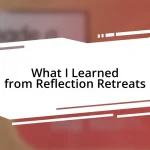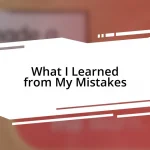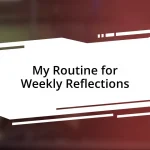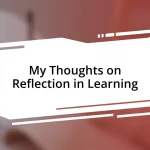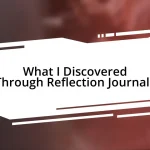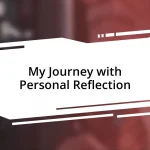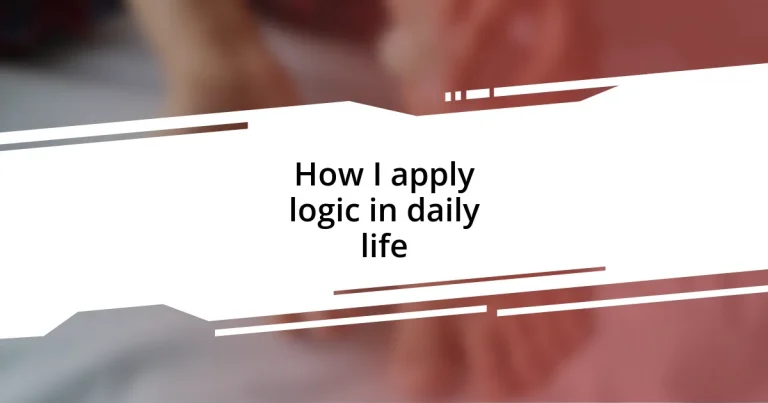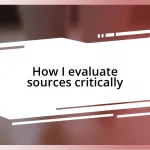Key takeaways:
- Applying logic simplifies decision-making in daily situations, from managing finances to resolving conflicts, enhancing overall well-being.
- Techniques like the Socratic method, visualization of pros and cons, and deductive reasoning help clarify thoughts and improve problem-solving.
- Recognizing and addressing logical fallacies strengthens arguments and enhances productive discussions in disagreements.
- Using structured approaches, such as pros-and-cons lists, leads to clearer decisions and reduces chaotic discussions in group settings.
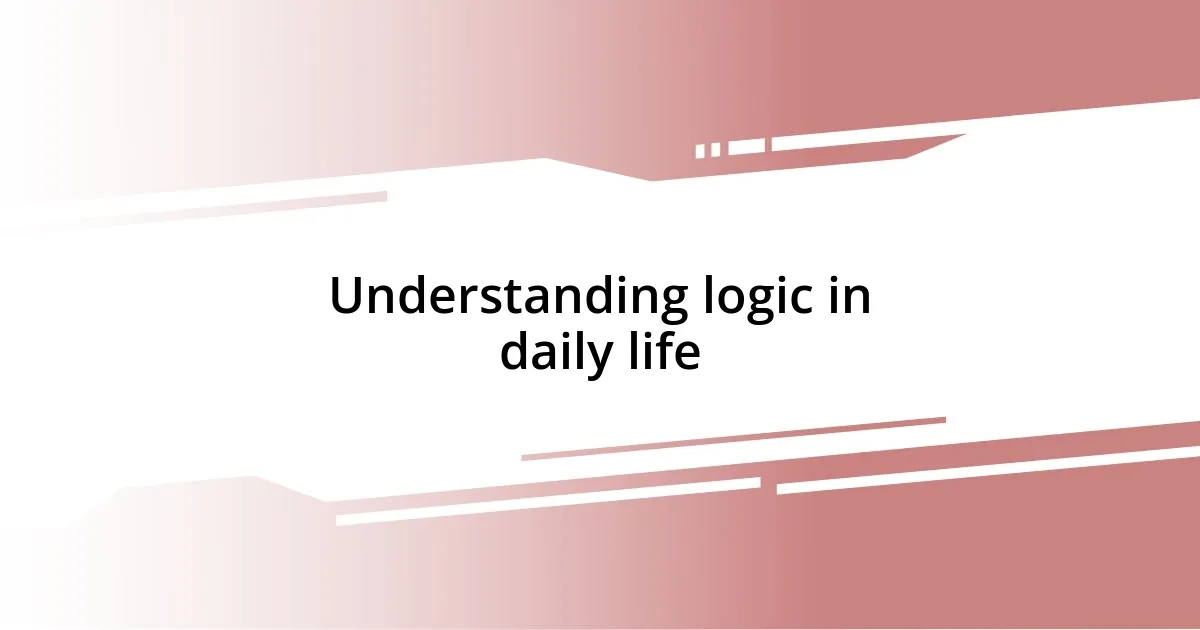
Understanding logic in daily life
Logic in daily life isn’t just for mathematicians or scientists; it’s a tool we can all wield. I remember a time when deciding which bill to pay first sparked a mini-crisis for me. By laying out the consequences of delaying each payment logically, I not only cleared my confusion but also felt empowered in managing my finances. Isn’t it interesting how a bit of rational thinking can transform a stressful decision into a manageable task?
When I face a disagreement with a friend, I find that approaching it logically changes the dynamics entirely. Instead of letting feelings dictate the conversation, I ask myself, “What are the valid points on both sides?” This shift not only helps in resolving the conflict more amicably but often deepens our friendship. Have you ever tried to see an argument from another perspective? It’s eye-opening how empathy and logic can blend beautifully in interpersonal relations.
I often see everyday tasks through the lens of logic, and it simplifies things remarkably. For instance, when planning a meal, I consider not just what I want to eat, but also what ingredients I have on hand. This logical approach not only saves time but also cuts down on food waste, which feels gratifying. Have you noticed how a little bit of structured thinking can clear the clutter from our daily routines?
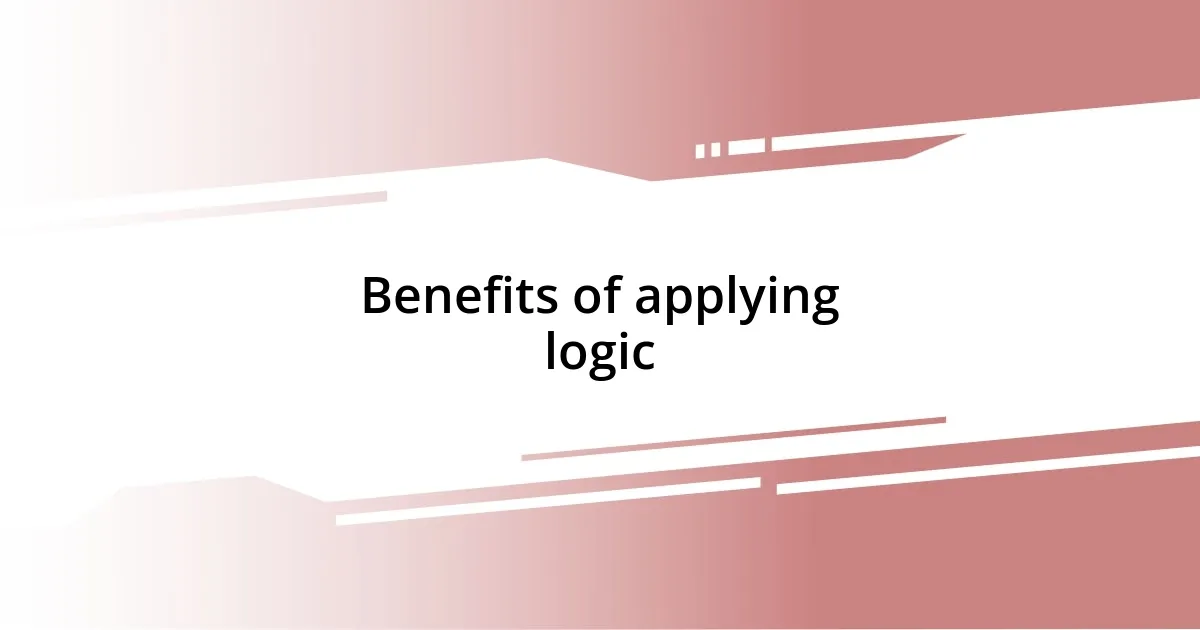
Benefits of applying logic
Applying logic in daily life offers numerous advantages that can enhance our decision-making and overall well-being. For instance, I often find that when I take a step back and analyze a situation logically, I’m able to view it from a clearer perspective. There was a moment when I was contemplating whether to accept a job offer. By weighing the pros and cons methodically, I realized that the new position aligned perfectly with my long-term career goals. That logical approach gave me the confidence to make a choice that felt right, rather than one driven solely by immediate emotions.
The benefits extend beyond personal decisions, too. Logic helps streamline my interactions and fosters better communication with others. Here’s a quick look at the perks of applying logic in daily life:
- Enhanced decision-making: Evaluating situations coherently leads to more informed choices.
- Reduced stress: Breaking down problems logically minimizes anxiety and confusion.
- Improved relationships: Understanding varying perspectives can strengthen bonds with others.
- Increased productivity: Logical thinking helps prioritize tasks, making life feel less overwhelming.
- Better conflict resolution: Addressing disagreements with a logical mindset leads to constructive outcomes.
Each time I remind myself of these benefits, it reinforces my commitment to using logic as a daily tool. Engaging with life this way has not only made me more efficient but has also opened up a world of clarity and connection I never realized I was missing.
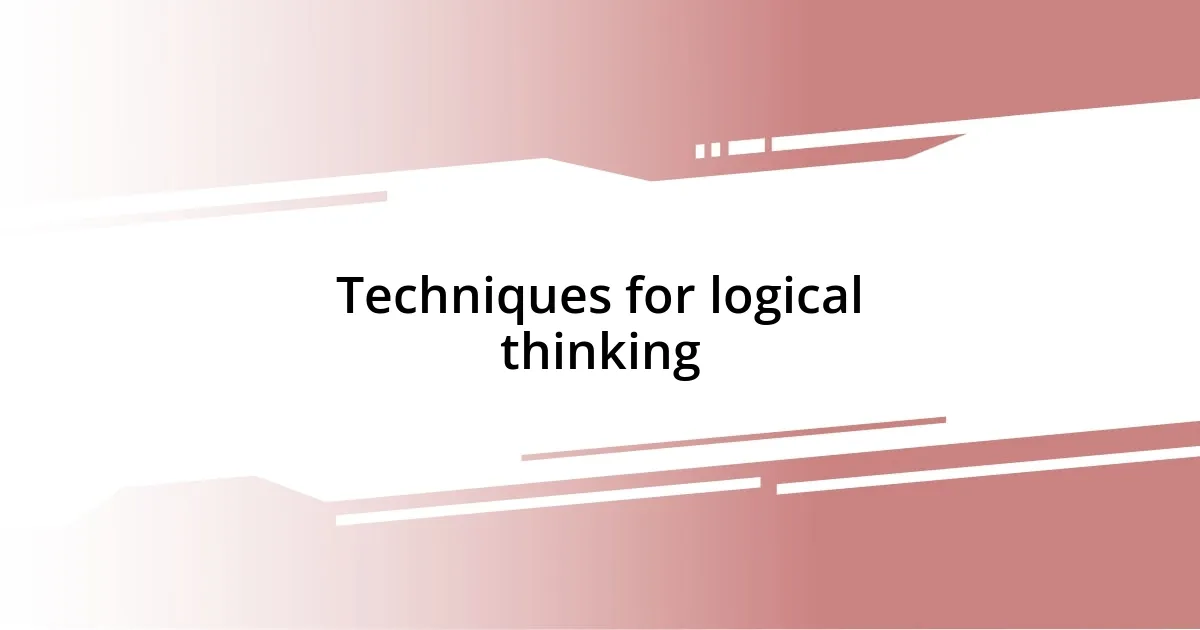
Techniques for logical thinking
Applying logical thinking in my daily life involves a few techniques that have really worked for me. One method is the Socratic method, which is all about asking questions to get to the core of an issue. I remember sitting with a friend who was conflicted about a relationship. By asking her questions like, “What are your needs?” or “What do you hope for in the future?” she reached insights that would have otherwise been buried under a cloud of confusion. It’s fascinating how probing questions can clarify thoughts and reveal options.
Another technique I frequently use is creating lists or charts to visualize decisions and outcomes. This practice came in handy when I was trying to decide on a vacation destination. I created a simple pros and cons table for each option, which included factors like cost, activities, and travel time. Having everything in front of me made the decision clearer and less daunting. It’s astonishing how a little structure can provide such relief, isn’t it?
Finally, I often apply deductive reasoning in my everyday problem-solving. For example, when planning my week, I consider my obligations and how they fit together logically. I have learned to chunk my tasks by day and priority, which not only keeps me organized but also gives me time to recharge. It’s a deeply rewarding feeling to accomplish what I set out to do, all because I applied a bit of logical thinking.
| Technique | Description |
|---|---|
| Socratic Method | A technique involving asking deep questions to encourage critical thinking. |
| Visualization | Using charts or lists to layout pros and cons to clarify complex decisions. |
| Deductive Reasoning | Breaking tasks into manageable pieces based on priority and scheduling logically. |
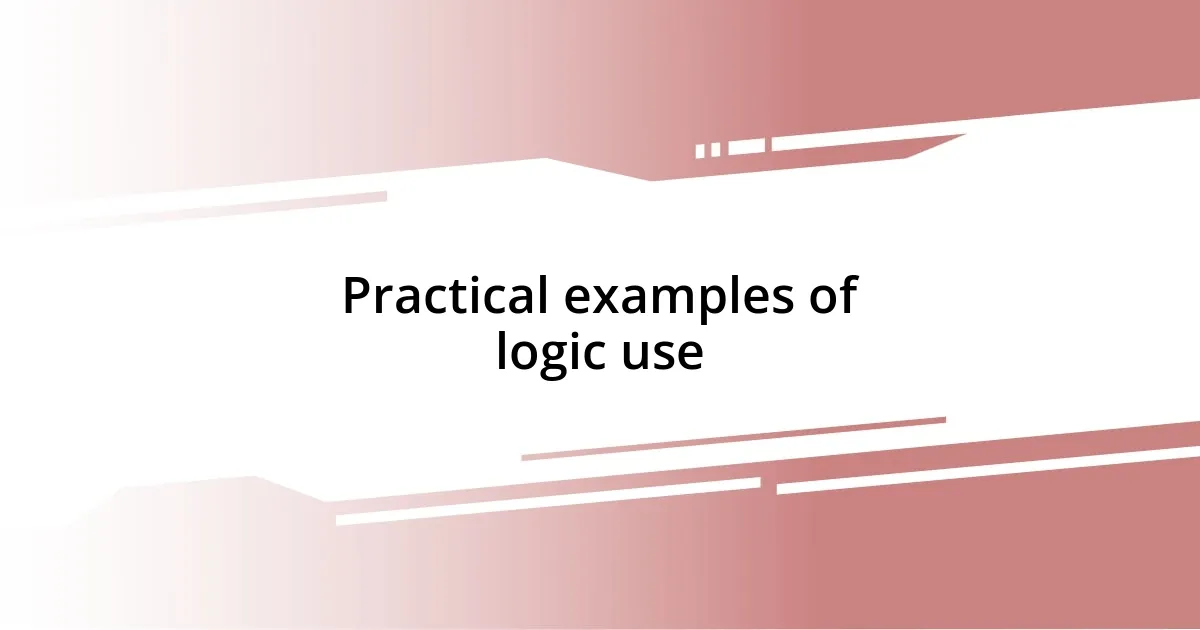
Practical examples of logic use
I often find myself applying logic when preparing meals for the week. Initially, I used to just cook whatever I felt like at the moment, which often led to chaos and leftover food going bad. Then, I took a step back and started planning my meals. Now, I analyze what ingredients I have and create a grocery list based on what I’ll use throughout the week. This simple act of logical planning not only saves money but also ensures I eat healthier. Isn’t it incredible how a bit of organization can transform what once felt overwhelming?
Another practical example comes from managing my finances. At times, I felt lost, wondering why my budget never seemed to align with my spending. So, I began employing a basic logical formula: if I know my income and fixed expenses, I can logically figure out how much I have left to save or spend. By breaking it down weekly, I keep my finances in check without stressing about sudden costs. This logical framework not only alleviates anxiety but also empowers me. Have you ever thought about how controlling your budget can influence your overall peace of mind?
Lastly, I apply logic when resolving conflicts with friends. There was a time when a misunderstanding with a close friend led to some tension between us. Instead of letting emotions dictate my response, I decided to sit down and discuss the situation calmly. I mapped out my perspective and invited them to share theirs. By approaching the issue logically, we were both able to see the miscommunication, which allowed us to resolve it with ease. It’s a beautiful moment when logic builds bridges instead of walls – don’t you think?
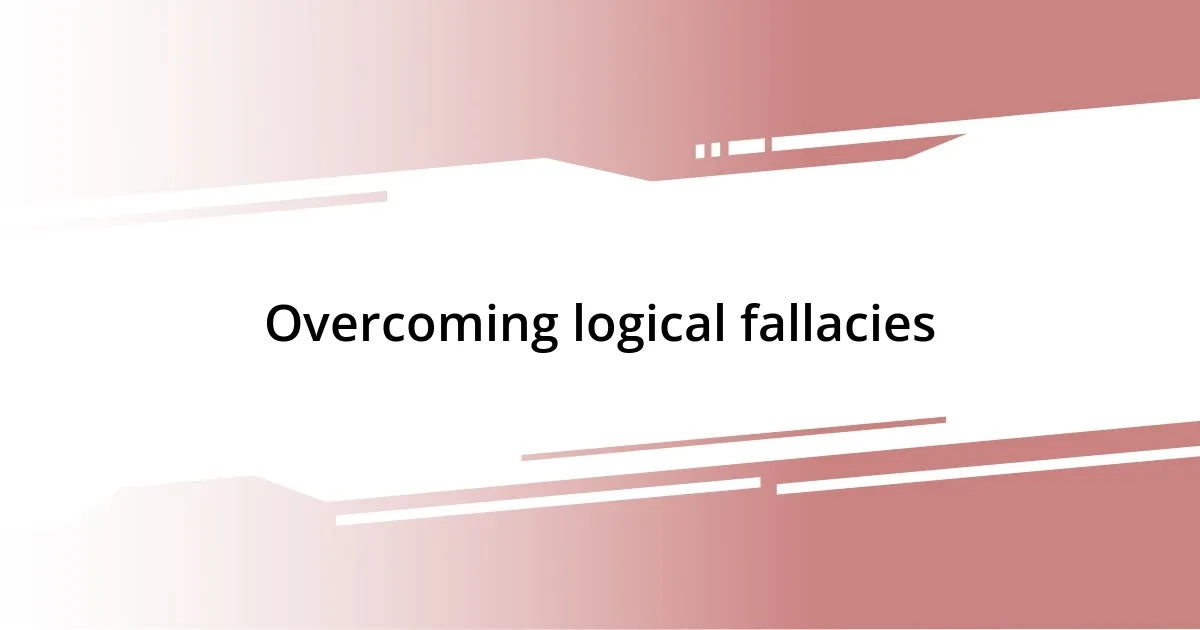
Overcoming logical fallacies
When I come across a logical fallacy, it often feels like stumbling into a maze where the exit is nowhere in sight. For instance, I once argued passionately about the importance of a plant-based diet, only to fall into the trap of the straw man fallacy. I was so focused on emphasizing the health benefits that I oversimplified opposing views. Reflecting on that moment, I realized that recognizing and addressing these fallacies strengthens my arguments rather than weakening them. Have you ever caught yourself slipping into a similar thought pattern?
Another time, during a heated debate on social media, someone presented an ad hominem attack instead of addressing the argument itself. Rather than getting defensive, I took a step back and calmly pointed out the nature of the fallacy. This not only helped clarify the discussion but also turned the conversation into a constructive exchange. Tackling these fallacies head-on feels like wielding a shield against confusion—it’s incredibly empowering. How do you feel when you manage to redirect a discussion that’s veered off course?
One effective strategy I’ve developed is to take a moment to assess disputes methodically. When I find myself in a disagreement, I jot down the main points of contention and categorize them based on evidence and emotion. This approach helps me segregate facts from feelings, ensuring that my focus remains on logical reasoning. For instance, during a disagreement with my partner about weekend plans, this technique guided us back to a mutual understanding, rather than letting miscommunication escalate into frustration. How do you navigate through complex discussions, especially when emotions run high?
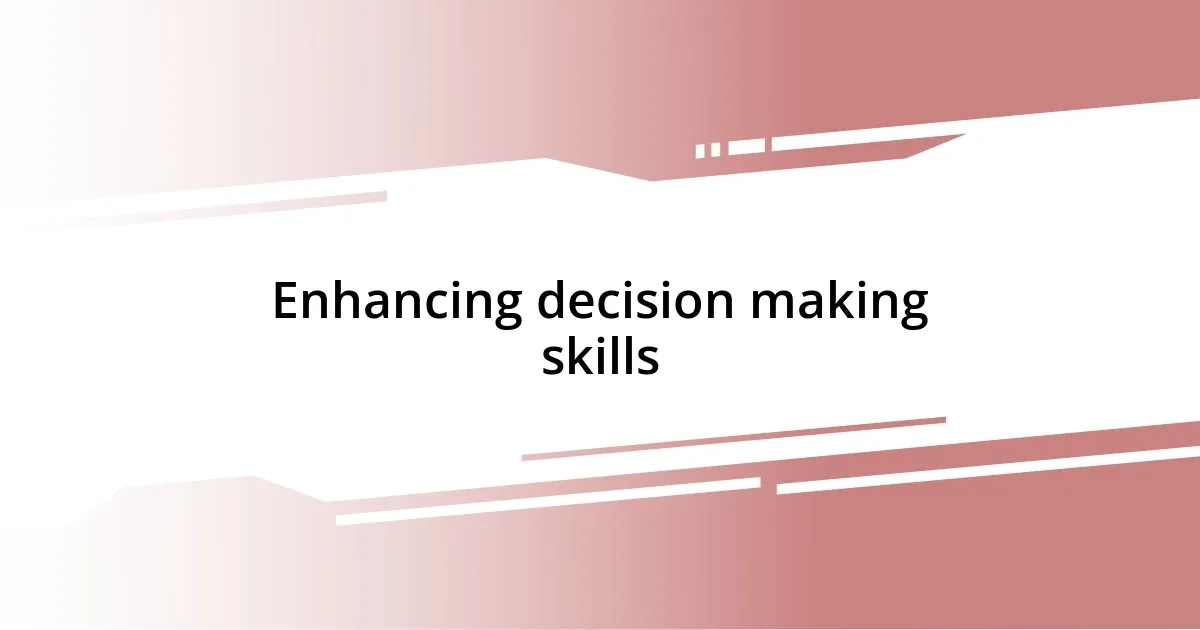
Enhancing decision making skills
When faced with a significant decision, I often employ a simple pros-and-cons list. Recently, I contemplated switching jobs, and instead of succumbing to the excitement or fear surrounding it, I wrote down the advantages and disadvantages. This method doesn’t just clarify my thoughts; it brings an emotional balance to the process, allowing me to evaluate the situation logically. Have you ever benefited from a straightforward list when making a choice?
In another instance, deciding on a vacation destination with my family became a bit chaotic, with everyone having different preferences. Instead of getting overwhelmed, I suggested a group discussion where we could each present our top choices based on budget and travel time. By focusing on these logical criteria, we reached a consensus that satisfied everyone, making the planning process enjoyable rather than stressful. It’s fascinating how a structured conversation can resolve potential conflicts, isn’t it?
One experience that stands out is when I had to choose between two paths in my career. The decision felt monumental, and I began by reflecting on my long-term goals and values before making any moves. I asked myself pointed questions like, “Which choice aligns best with my aspirations?” This introspection, steeped in logic, gave me clarity and confidence in my decision. I ended up choosing a path that seemed riskier but ultimately felt right. Have you ever had a similar moment where logical questioning led you to a breakthrough?
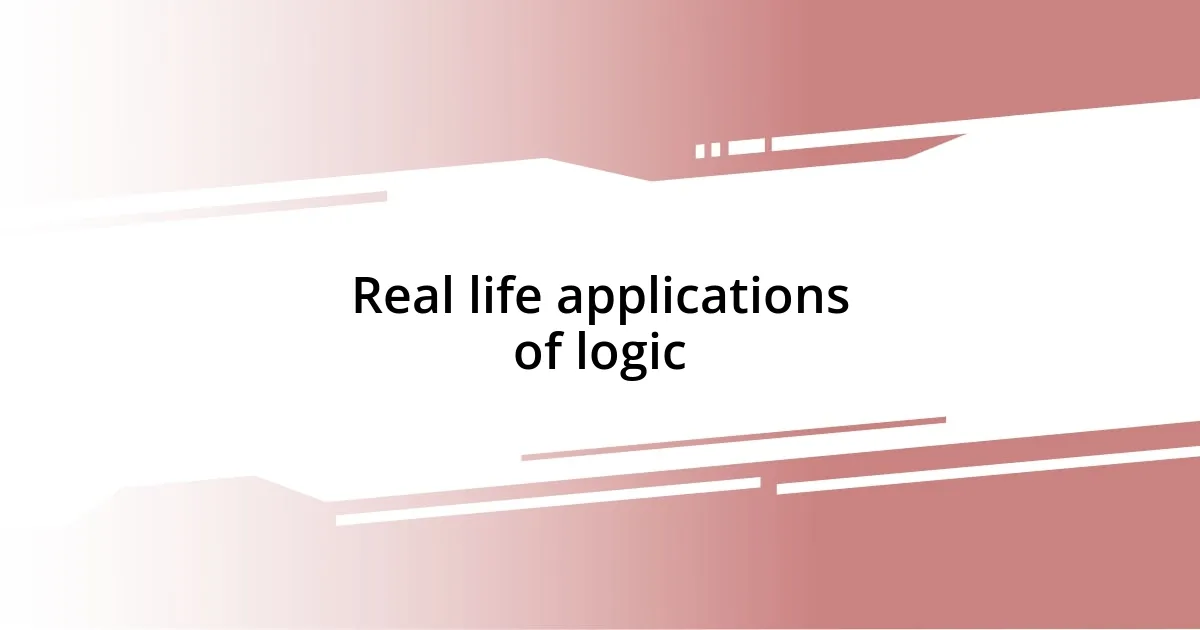
Real life applications of logic
One real-life application of logic that I’ve found particularly helpful is in troubleshooting everyday problems. For instance, when my car wouldn’t start, I didn’t let panic take the wheel. Instead, I approached the situation like a detective, asking myself a series of logical questions: “Is there fuel in the tank? Are the battery connections secure?” This method not only saved me time but also minimized unnecessary stress. Have you ever tackled a problem by breaking it down into manageable pieces?
On another occasion, I used logical reasoning when planning my budget for the month. Instead of merely guessing how much I would spend on groceries and entertainment, I analyzed my past expenses. By categorizing my spending into fixed and variable costs, I could identify areas for potential savings. This allowed me to allocate funds more effectively, giving me a sense of control over my financial situation. Isn’t it satisfying to see how a logical approach can lead to better outcomes in our financial lives?
Lastly, I often apply logic when evaluating news articles or information I consume daily. It’s so easy to get swept up in headlines, but I’ve learned to ask critical questions: “What evidence supports this claim? Is it coming from a reliable source?” This habit has sharpened my discernment and shielded me from misinformation. By maintaining a skeptical eye, I not only protect my perspective but also become a more informed individual. How do you ensure that the information you consume is credible and well-reasoned?



